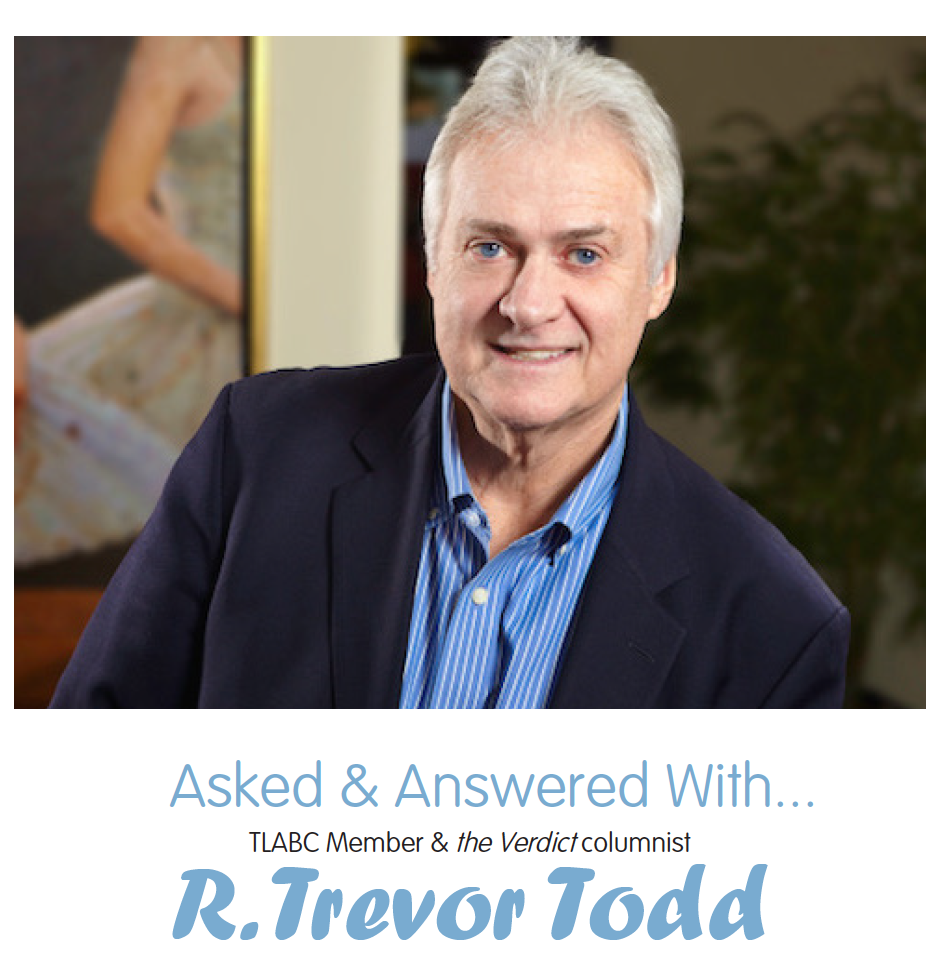Trevor Todd was recently interviewed for an article in the Verdict (issue 155). View the original article here.
(1) the Verdict: With regard to both law clients and the legal system in general, what does the word justice mean to you?
Trevor: Justice. As an estate litigator I view the concept of justice through the courts of equity that my disinherited clients actually deserve, merit, and are entitled to share in the estate that has been created by typically their parents. Typically my disinherited clients are victims from a dysfunctional family where they were badly treated. I am very grateful that British Columbia has the provisions of the wills variation act ( now section 60 WESA) enshrined so that there is a moral obligation on behalf of parents to provide for their children and a legal obligation to provide for their infant children. The Canadian legal system certainly is not perfect in providing justice, but I venture to say, it is probably one of, if not the very best legal systems in the world.
(2) What were among the main reasons you chose to pursue a career in the legal profession?
The main reason I pursued a career in the legal profession is that my father had the aptitude of a lawyer but did not have the opportunity to attend law school. I remember as a child wanting to be a lawyer and recall completing my application to law school with the simple words “I have always wanted to be a lawyer”.
(3) When it comes to the legal professional, what is just as important to you now as it was 43 years ago at the start of your career as a lawyer?
I like to think that anyone who pursues a career in law is first and foremost guided by the overall principle of trying to help people with their legal problems. Throughout my career I have always obtained my greatest satisfaction in bringing a case to a satisfactory conclusion, and hopefully having attained the desired goal of my client.
(4) Being asked to represent an individual on a personal legal matter is an honour and a tremendous responsibility. What advice would you impart to new lawyers with respect to how they should approach meeting a potential client for the first time?
My advice to new lawyers with respect to how they should approach meeting a client for the first time is to listen carefully and ask probing questions to ensure that the client has merit to their claim before accepting their retainer. I urge lawyers to learn to say “no” much more than they typically do when it comes to accepting the retainer of every possible client. For example, if the client has previously retained more than two lawyers ( without valid reason such as retirement) , then I urge caution in accepting that potential client as the red light might be that the client is unreasonable. This is particularly the case when accepting contingency fee arrangements as in my view, it is the lawyer that bears most of the risk and not the client.
(5) Your practice has changed over the years, perhaps most notably by the fact that these days your work is exclusively focussed on estate litigation. In which way does your approach to work today differ significantly from your approach during your first 10 or so years in the practice of law?
When I started practicing law in 1974 I had an extremely general practice where in the same day I might do and impaired driving, a commercial lease and an uncontested divorce. In retrospect, I believe that most lawyers then did not do a particularly good job if they maintained such a practice, which I believe most did. Approximately 25 years ago I took a number of courses on focusing your practice and realized that specialization is not only what the public wants, but leads to a far more financially successful less stressful practice, as well as greater peer recognition. Coincidentally, at about the same time I had a significant estate litigation trial, which made the front page of the province and Vancouver Sun. It was an epiphany for me in terms of what I wished to do exclusively in my practice.
(6) What are among the most difficult aspects of your workweek, be it logistics or otherwise (e.g. time management, commuting, scheduling)?
I no longer have any difficult aspects in my work week as many years ago I developed the concept that I would strictly control my practice as opposed to allowing the practice to control me. I have stringently restricted the number of cases that I take each year to a very manageable number and only take cases that I think are of merit, interest and financial reward. I have noted that most lawyers are victims of overwork with too much stress and non-appreciative clients- I consider that their practices are largely examples of “the tail wagging the dog”.
(7) What are among the most challenging aspects of the cases you take on regularly?
The most challenging aspects of the cases that I regularly take are that they are often referred to me by other lawyers as being difficult and requiring expertise. I have particularly enjoyed the cases where it has been necessary to try “pushing the plaintiff’s envelope” by trying typically equitable remedies to overcome difficult fact situations.
(8) “Money Matters” is the theme of this edition of the Verdict. Money can be – and nearly always is – a challenging topic for anyone, regardless if we’re talking personal or professional. You are deep into a career that uniquely fuses personal and professional needs and obligations – with money, assets and family at the heart of it all. The Wills, Estates and Succession Act (WESA) is now eight years old (Royal Assent on October 29, 2009), has it been a great eight for the people of BC?Oversimplification aside, are money matters better (closer to just) for citizens who require legal assistance after the death of a loved one?
WESA came into effect on March 31, 2014 and comprised a great number of changes from previous estate statutes. Initially the provisions of the wills variation act that allowed an adult independent child to contest a will were not to be included in the new legislation. I (amongst others) strongly lobbied against this and spoke to a number of bar associations and wrote a number of articles to the effect that this provision should be kept in the new legislation. Atty. Gen. Oppal in his wisdom, fought the cabinet against this change, and prevailed. His rationalization amongst others was that many Southeast Asian women would be disinherited and would have no legal remedy. This is a very significant factor in that British Columbia is the only province in Canada, and one of the few places in the world other than New Zealand that allows an adult independent child to contest a will on the basis that they were not adequately provided for by their parents. The other significant change of WESA is the extreme relaxation of the rules relating to the proper execution of a will. One of the first cases in this regard was a court allowing a suicide note (unwitnessed of course) to be declared a valid will under the curative provisions of the act.
(9) Many of today’s legal professionals contend that law school did not prepare them for some of the biggest or most important aspects of managing a law practice. What is one practical everyday thing you learned from scratch, after earning your law degree?
The biggest complaint I have with respect to law school is that while they teach the student to analyze case law quite well, there was, and I believe still is, no training whatsoever with respect to the management of a law firm. Most law professors have never practiced law. Probably the biggest change that I have noted in the profession is that for approximately the first 20 years of my practice law was considered a “noble profession “whereas the reality is that it is increasingly “big business” on an worldwide basis. What I quickly learned after entering practice is that each lawyer is expected to have business skills, including marketing, and to be productive in the monetary sense. Many of the brightest students weren’t necessarily good at these skills. I have learned that personality and practical common sense are usually more valuable in the practice of law than high intellect.
(10) If you chose another career path, what would it likely have been, and which careers are among the ones you would consider nicely suitable to your skills and aspirations?
With respect to alternate career paths other than law, most of my classmates had a political science undergraduate degree. I recall writing an aptitude test just prior to entering law school and my main aptitude was that of the social sciences professor. In latter years, I have realized that I would probably have pursued a Masters in business administration If I had been unable to be accepted in law school. One of the things I have liked about law as a career, that equally applies to an MBA degree is the number of diverse avenues that can be followed if one is so inclined.
(11) What do you consider to be among the greatest traditions of life as a lawyer?
I consider one of the greatest traditions of life as a lawyer is the camaraderie of the profession throughout the world. I travel a great deal and have noted that no matter where I am, there is much in common with practitioners in the foreign country.
(12) You’ve been a member of TLABC from the early days of this association. You served a year as TLABC’s president and you were a dedicated member of the board of governors for well more than a decade. Aided by your experience to date and the benefit of hindsight, what do you regard as a significant way in which things have changed for lawyers who chose to join this professional association? Put another way, generally speaking, are professional associations and memberships more relevant than ever or are most of today’s professionals inclined to keep to themselves with regard to their practice issues?
I can still recall attending a TLABC seminar in 1982, and thinking that was by far the best, most practical seminar I had ever attended. The American attorneys who spoke were high-powered and inspirational. The course was so different and more practical than the CLE courses that I had taken. I immediately joined the fledgling association and got on the executive. Our first meeting was in Ian Sisset’s kitchen as TLABC did not have an office until my presidency in 1987. I have been writing an estate column for the Verdict now for approximately 22 years. I have urged a great number of young lawyers to get involved with TLABC and consider it to be one of the very best professional legal associations. With the decline in mentoring over the years I think it is more important than ever for lawyers, and in particular young lawyers to join such professional associations.
(13) Whether far back in world history or in modern times, who are some of the lawyers and laypeople that come to mind when you think of people you admire, and what do you find most admirable about them?
Lawyers and laymen I admire in world history are Margaret Thatcher and Mikhail Gorbachev for their strong individual beliefs that were contrary to the prevailing thought of their time and circumstances and who largely helped to end the Cold war that persisted throughout most of my life.
(14) If you could have been counsel on any case in world history – in any field of law – which case would it have been, and what is it that draws you to it? Additionally, which lawyer or lawyers in history do you think you would have enjoyed most working against or alongside?
If I had been counsel on any case in world history, I would choose being a prosecutor at the Nuremberg war crimes trials. I greatly admire the prosecutors who have participated in trials against genocide. Such work appeals to both my keen interest in world history as well as huma rights justice.
(15) Featuring law as a central theme or as a compelling backdrop to a story, which books or films are at the top of your list of favourites?
I have never been attracted to television portrayals of the practice of law as Perry Mason and LA Law gave very false impressions to the general public as to what the profession is truly like. On the other hand I admit to being a John Grisham addict and have read every one of his books, including his few non lawyer ones.
(16) Which mantra, quotation or expression do you find particularly inspirational, one that is powerful enough to guide you through the toughest of days?
The quotation that helped me the most in the development of my estate litigation practice was back when I had one case and was wondering when the next one might come in the door. It was the very early 1990s, and when I bemoaned the fact of that I had grave concerns about making a success of it, a friend stated” Rome wasn’t built in a day”. That quote somehow caused me to realize that perseverance in the pursuit of something that you really want will invariably prevail.
(17) Trevor Todd – if all of your arguments were made and your law books were closed forever, where would you be living and what would your life be like? Alternatively, describe an ideal non-work day in which you are living life exclusively on your terms.
At this time I cannot come to grips with what it would be like to not practice law anymore. Many of my contemporaries have retired or are thinking about it. My attitude remains that I will do it until “I drop,” If I did have to describe a non-workday in which I was living exclusively on my terms, it would probably involve adhering to the principles set out in the book “ The Four Hour workweek” and realizing that I could be living in a foreign country in the lap of luxury, working only as and when I wanted, and enjoying life on my own terms.
(18) At this stage of your career – with the sum and strength of 43 years of experience as a lawyer – what can you, legal professional, say for certain about law?
After 43 years of practice, I can state that there will always be a need for lawyers in our society, but as a profession, It is threatened not only by an overabundance of lawyers, but technology such as artificial intelligence. The lawyer of the future will need to be highly specialized and able to adapt to radically changing social situations.
(19) Today, with the benefit of your life experiences to date, what can you – Trevor Todd – say for certain about life?
With respect to life experiences, I think the quote from Forest Gump that “life is like a box of chocolates- you never know what you’re going to get” is most apt. As far as certainty goes it is limited to death and taxes.









